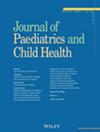Behavioural Changes of Late Talkers During the Covid-19 Pandemic, One Year Follow-Up From a Community Sample
Abstract
Aim
Global threats to child health and well-being, compounded by the COVID-19 pandemic, have put child development at grave risk. This study aimed to observe the behavioural changes of children with isolated language delays from a paediatric outpatient clinic as a community sample during the pandemic with a 1-year follow-up.
Methods
Patients admitted to the paediatrics outpatient clinic due to isolated language delays were included in the study. The Ages and Stages Questionnaire and Child Behaviour Checklist-1½-5 were implemented at baseline and 1 year later. All families were provided with information on developmental supportive strategies and called at 3-month intervals for follow-up.
Results
Eighty-three children were initially included in this prospective study and completed with a 66.3% retention rate after 1 year. The mean initial age of the children was 30 ± 5.1 months. Internalising behaviour problems were high enough for concern at the baseline and all behavioural problem scores decreased after 1 year (p < 0.001). The initial proportion of children with borderline or clinical internalising problems also decreased from 69.1% to 5.5% after 1 year, and most children had normal language development.
Conclusions
Late talkers experienced some behavioural problems during the pandemic, and the language and behaviour outcomes of these children who attended the paediatric clinic were better after the 1-year follow-up, even during the COVID-19 pandemic. The management of language delays in young children in crisis should include providing families with developmental support strategies consistently through the paediatric healthcare system to optimise child developmental and behavioural functioning.

 求助内容:
求助内容: 应助结果提醒方式:
应助结果提醒方式:


